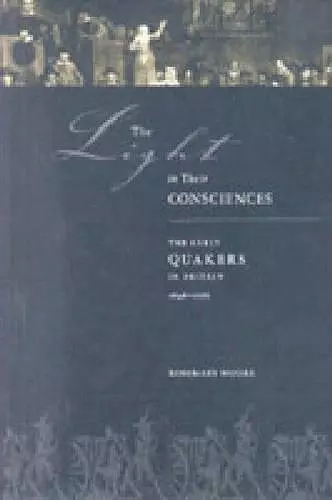The Light in Their Consciences
The Early Quakers in Britain, 1646–1666
Format:Hardback
Publisher:Pennsylvania State University Press
Currently unavailable, and unfortunately no date known when it will be back
This hardback is available in another edition too:
- Paperback£29.95(9780271053806)

The Society of Friends, also known as the Quakers, originated in England during the civil wars of the mid-seventeenth century. Early Quakers have been variously described as founders of a fundamentally new form of spiritual practice, as the radical end of the Protestant Reformation, and as political revolutionaries. In The Light in Their Consciences, which recounts the earliest history of the Friends in England, Rosemary Moore suggests that all of these characterizations are accurate and can help us grasp the true significance of Quakerism.
Moore offers compelling portraits of the leading figures of the Quaker movement, notably George Fox, James Nayler, and Margaret Fell. She shows their interrelationships and documents the emergence of George Fox as the leading Friend, relying not so much on Fox’s own proclamations as on the perceptions of both his followers and his enemies as reflected in correspondence and printed pamphlets. Moore also charts the growth of a genuine denominational consciousness among Friends. This leads her to continue her account past the customary stopping point of 1660—the Restoration of Charles II—up through 1666. It was in that year that Fox initiated major organizational reforms that signaled the true dividing line between the early charismatic Quaker movement and the introverted sect of the later seventeenth century.
The Light in Their Consciences combines a lively narrative with impeccable research. Moore draws upon unprecedented computer-based analysis of all the contemporary Quaker and anti-Quaker literature. Her account will interest historians, theologians, and members of the Society of Friends throughout the world.
“Rooted firmly and deeply in the pamphlet and manuscript sources of the period, this study embodies a masterful exploration of early Quaker life and thought. In its lucidity and depth, Rosemary Moore’s book clearly deserves an honored place among the first rank of studies of Quaker origins. No one interested in the topic can afford to pass this fine book by. Let’s call it what it is: history at its finest.”
—H. Larry Ingle,Author of First Among Friends: George Fox and the Creation of Quakerism
“I would urge an investment in Rosemary Moore’s readable prose and clear exposition of Quaker theology.”
—Gil Skidmore Reading Monthly Meeting
“By highlighting the enduring tension between the individual interpretation of the Light and the importance of group witness, this book provides the prologue not only to the Wilkinson-Story controversy which threatened to split the Quaker movement in the 1670s, but to the continuing and accelerating evolution of a socially abrasive Puritan sect into a respectable, and respected, religious movement. With analytical material moved to endnotes, this book is well-suited to the interested general reader. However, the integrity of its scholarship and useful critique of source material also makes this work very suitable as a text for those studying early modern religion, and especially the fragmenting nature of English Protestantism in the seventeenth century.”
—Beverly Adams Ecclesiastical History
“Rosemary Moore provides a welcome addition to early Quaker studies.”
—Arthur J. Worrall Pennsylvania History
“[T]his is a fine contribution to Quaker studies. . . . Since its publication in 1964, Hugh Barbour’s The Quakers in Puritan England has been the indispensable starting point for studying the first generation of Friends. Although Barbour’s work is still useful, Rosemary Moore’s The Light in Their Consciences has supplanted it as the essential foundation to explore early Quaker history.”
—Richard L. Greaves Sixteenth Century Journal
ISBN: 9780271019888
Dimensions: 229mm x 152mm x 25mm
Weight: 653g
328 pages